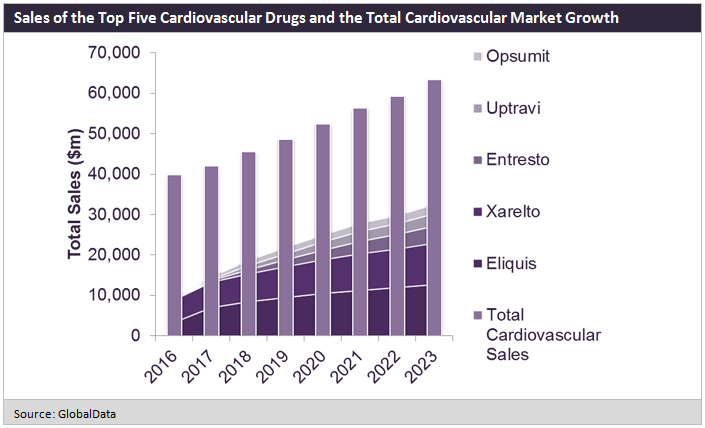Total sales for cardiovascular diseases will grow steadily over the next six years, reaching about $60B in 2023.
The top five major drivers of this growth will be two anticoagulants (Bristol-Myers Squibb’s [BMS’] Eliquis [apixaban] and Johnson & Johnson [J&J]/Bayer’s Xarelto [rivaroxaban]), a heart failure drug (Novartis’s Entresto [sacubitril/valsartan]) and two drugs for pulmonary arterial hypertension (J&J’s Opsumit [macitentan] and Uptravi [selexipag]). These five drugs will represent 50% of the total cardiovascular market in 2023, while Eliquis and Xarelto alone will represent 36% of the whole cardiovascular market. Cholesterol-lowering drugs were not part of this analysis, as they were considered to be part of the metabolic disorders therapeutic area.
The rest of the cardiovascular market, excluding the aforementioned five drugs, will not experience a significant growth over the coming years. This is mainly due to the fact that this market is very mature and heavily genericized, and therefore difficult to penetrate. However, this whole space is replete with unmet needs as most of the cardiovascular conditions are incurable. Thus, there still remains a huge opportunity for drug developers to tap into this potentially lucrative market with innovative and ideally disease-modifying therapies.
Currently, many companies are hesitant to invest into this market due to a low return on investment. However, as exemplified by Eliquis, Xarelto, and Entresto, all of which penetrated heavily generic spaces, targeting the right patient populations with high unmet needs can be exceptionally profitable.

US Tariffs are shifting - will you react or anticipate?
Don’t let policy changes catch you off guard. Stay proactive with real-time data and expert analysis.
By GlobalData



